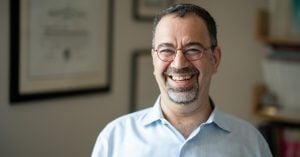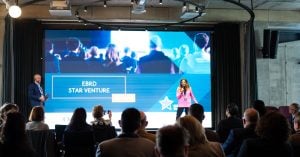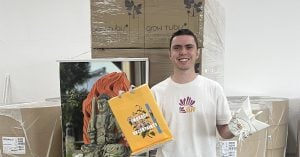Traditionally, the utility sector has been slow to adopt new technologies and innovative practices. Being heavily regulated, the utility industry tends to be governed by policies that can often impede innovation, making it difficult for utilities to keep up with the pace of technological change.
Moreover, utilities often operate under tight budgets, which can limit their ability to invest in innovation. The role of the sector is also critical to the functioning of society and the economy, and any disruptions would have serious consequences. As a result, many utilities are risk-averse and slow to adopt new technologies.
However, despite these challenges, the utility sector is starting to embrace innovation, driven by the need to improve efficiency, reduce costs, and enhance the customer experience.
“The sector might be perceived as conservative but that does not mean that innovations cannot be incubated and commercialized within the sector. Actually, Veolia has done a lot in changing that perception and mindset. One of our latest concepts in that direction for example is the multifaceted approach – that means that we are determined to achieve the same level of consideration and expectations regarding economic, financial, commercial, social, societal, and environmental performance in every action and decision that we take. In addition, our strong belief is that we have to combine our internal experience in R&D with the external knowledge and inspiration of newly established companies,” Francois Debergh, Country Director of Veolia for Bulgaria and Greece, explains for The Recursive.
The French corporation specializing in water, waste, and energy management Veolia (owner of “Sofiyska Voda AD”) has developed a holistic approach and understanding of several innovation fields.
“For a couple of years already, Veolia has researched solutions to treat microplastics in water, a huge problem for our societies. And this is to stimulate innovation in technologies for processing used water. Today we go even further – micropollutants that endanger water resources. I would like to mention that we also use innovation in the energy sector: for example, recently we succeeded to switch the fuel for a local thermal power plant to methane gas thus reducing its carbon footprint. Veolia is a pioneer in searching for new types of food for the future as we know that protein insufficiency is knocking on our door,” Francois Debergh adds.
Dive into the interview with Francois Debergh to understand what innovation looks like in the utility context.
The Recursive: How does Veolia structure its innovation processes to nurture green innovation both externally and internally?
Francois Debergh: Veolia, as a global company has two main directions for innovation – internally through its Research and Innovation department and externally, through cooperation with universities, research institutes, and, of course, start-up ecosystems in different countries. This gives us the possibility to cover a variety of opportunities in all three domains where we operate – water, energy, and waste management. One of our biggest advantages is that we have numerous subsidiaries in these three domains where we could test, validate and further grow innovative ideas.
Of course, each of these projects, being a pilot, brings its own challenges but they are worth doing since these projects are going to solve particular environmental problems. The most important thing is to remain optimistic and to maintain the visionary approach. And from Veoila’s perspective, it is essential for us that the project achieves its objectives and meets or exceeds the expectations of all our stakeholders, and contributes to Veolia’s Purpose, which is ecological transformation, in the long run.
What kinds of partnerships do you develop with local partners to make ecological innovation regional, collaboratively advanced, data-driven, high-tech, and cost-effective?
We have to cooperate with a wide range of external partners in order to achieve high-tech and of course cost-effective results. It is not sufficient to partner only with start-ups because we would also like to address the funding part. That is why we actively cooperate with Venture capital funds (VCs) which could be potential investors in these start-ups after we validate their solutions and products. There is always an option to co-invest in start-ups with the VCs if these projects could meet our internal investment requirements. I would say that an active partnership with all stakeholders involved is the key to the initiation and implementation of successful innovative projects.
Veolia also actively cooperates with Bulgarian academic institutions. We regularly host joint events with the Faculty of Biology of Sofia University that stimulate the public debate on innovation to help the circular economy and also we showcase different projects in that direction. We are also a partner to Sofia University on a project financed by the European Union for the creation of a Center of Competence designed to facilitate the interaction and cooperation between science/universities and the private sector (the business) to co-create innovative ideas.
The Sofia Wastewater Treatment Plant (WWTP) is a flagship project in the field of circular economy in Bulgaria. We are particularly proud of this energy-independent wastewater treatment plant near Kubratovo. On the road to carbon neutrality at Sofia WWTP we generated 254 million kWh of green energy, 131 million m3 utilized biogas, and avoided 770 K tons of CO2 emissions in a 12-year period (2010-2022). In 2018, Kubratovo WWTP was recognized during the 6th Annual Energy and Water Exchange Awards in Lisbon, Portugal for its significant contribution to the water and wastewater sector, with a special focus on innovation in energy reduction and circular economy. Since 2014. The WWTP is registered under the Gold Standard Voluntary Carbon Mechanism, an emissions reduction scheme, and strict controls are in place to track environmental impact. Moreover, Sofia WWTP is not just a flagship project for Sofia Municipality but is also used by the European Commission as a benchmark and a model for energy efficiency and energy neutrality. for the current revision of the EU Urban Wastewater treatment directive.
How has your program for startups boosted circular economy initiatives in Bulgaria in the areas of water management and energy efficiency?
Well, to be honest, we are at the beginning of that journey but I could mention the collaboration we have initiated with SatGeo, a start-up we have nested in Sofiyska Voda to test their concept of water leak satellite detection. We put together joint teams with them and achieved really great results in the first 6 months – we managed to preserve 1.5 million m3 of water resources.
Other start-ups we actively cooperate with are GridMetrics and Sensato. GridMetrics helps us to improve the energy efficiency of our pumping stations through optimization of their working schedules while with Sensato we work on preserving biodiversity by introducing the so-called “smart hives” at some of our sites.
Are there any future corporate innovation initiatives you plan at the regional level?
Being part of a global company like Veolia, we have already expanded our cooperation with countries from the region where Veolia has activities such as Poland, Romania, and Germany. This will give us the opportunity to scale up our program, make joint calls for innovation, and cooperate with different start-ups not only from Bulgaria but also from the whole Central and Eastern Europe region. Of course, these regional partnerships should not be limited to Veolia participants only but could be expanded to involve other partners like financing institutions, NGOs, and branch associations.
Together with Sofiyska voda, operated by Veolia, The Recursive held “Corporate Venturing in SEE for Sustainable Startups” to show what is the value in incubating cleantech, greentech, and sustainability-related technologies in a corporate context. If you are keen on the topic of sustainability, watch the recording of the event.







